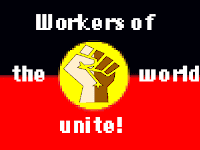We wage slaves are still bent double bearing our weighty burden, and it is becoming increasingly plain that our exploiters have no intention of lightening the load we are called upon to carry. We make our stand for socialism. Our cause is the cause of all those who live by selling their labour power, and no matter how chaotic the conditions or how eloquent the appeal of those who would divert us from our goal, we call upon the working class to make the means of life common property and establish a system of production solely for use. We are wholeheartedly in the fight for freedom—freedom from capitalist bondage. This is the only way in which a world worth living in can be brought into being: Socialism and socialism alone guarantee permanent peace. Socialism gives economic security and prosperity to all; Capitalism offers poverty, insecurity and war.
We are opposed to dictatorship in any form, but the enemy of the labouring class is the capitalists, and we should be unfaithful to our class and our class interests if we have cause to forget this historic fact.
When capitalism's economy is booming then some sections of the working class can make considerable gains. This, reformists assure us, is proof that their strategy of “getting something now” is more rewarding than our insistence on the need for socialism. But what happens when the economic climate changes? Then many of the gains inevitably come under attack and will be completely lost. “Getting something now" is difficult enough in capitalism but hanging on to it is the really tricky bit.
The productive resources of the world have long since reached the point which would allow mankind to go over, in a very short time, to free distribution of the things needed to life and to enjoy life. The technical problem of producing enough wealth for all to enjoy has been solved long ago. However, there could be temporary problems in supplying certain things — but at least, if there are to be problems, this is what they should be. How to provide more and not how to cut down consumption as is the case today. The Socialist Party is suggesting a world community where wealth is produced by voluntary labour and is available to all free of charge.
What we mean by free access is that no section of society will monopolise access to the means for producing wealth. These will belong to no-one and so will be the property of the whole of mankind to use as they think fit.Mankind will control the use of the means of production through democratic institutions. The capitalist system may have nominally democratic institutions, but it relies upon working class compliance, passivity and lack of involvement in the process to carry out its worst and most illiberal functioning. Real democracy can only be achieved on the basis of the common ownership of society’s means of living. Nationalism allows the politicians to limit democratic choice on the grounds that there is only one national interest and therefore only one general programme, one set of policies to be followed. However, one of the basic points about liberal democracy is that, as we put it in our declaration of principles, “all parties are but the expression of class interests”. This has long been a guiding principle in British politics, with the different interests of different sections of the ruling class being represented by the different parties.
To remove poverty the workers must by class conscious activity take from the master class their means of life. They must commonly own these means which to-day are the private property of the capitalist few. To enjoy the leisurely life, the modern powers of wealth-production make possible, social revolution is necessary. In order to change the basis of society from a production for profit to a production for use one, the workers themselves must first have the revolutionary outlook. No amount of capitalist evolution can bring the change to socialism that is necessary to free the workers. Capitalism has the seeds of its own destruction, but the workers must be the seeds.
Democracy is not a set of rules or a parliament; it is a process, a process that must be fought for. The struggle for democracy is the struggle for socialism. It is not a struggle for reforms, for this or that political system, for this or that leader, for some rule change or other—it is the struggle for an idea, for a belief, a belief that we can run our own lives, that we have a right to a say in how society is run, for a belief that the responsibility for democracy lies not upon the politicians or their bureaucrats, but upon ourselves.
The workers being content with the scraps and the offal, the gloomy hovels, and excluded from life’s real pleasures, have allowed their masters to take full advantage of their contentment. Blame or sympathy in either case is waste of time: nothing but the recognition that the removal of all social evils is their mission, and theirs alone, can rid society of such glaring contrasts in wealth and squalor. Experience is a hard and often a slow teacher, but there are signs that it has slowly but surely been doing its work.
Awaken, workers, to the possibilities of socialism, so that you may join with us for the social revolution.


.jpg)



